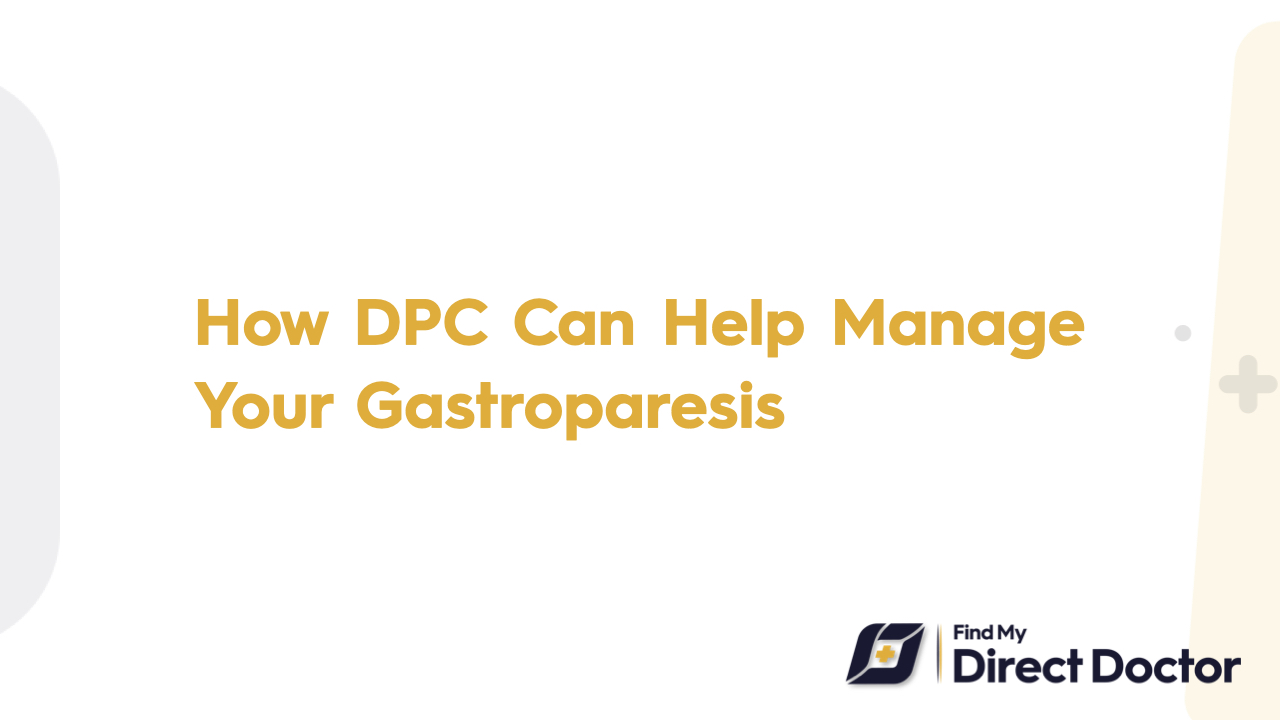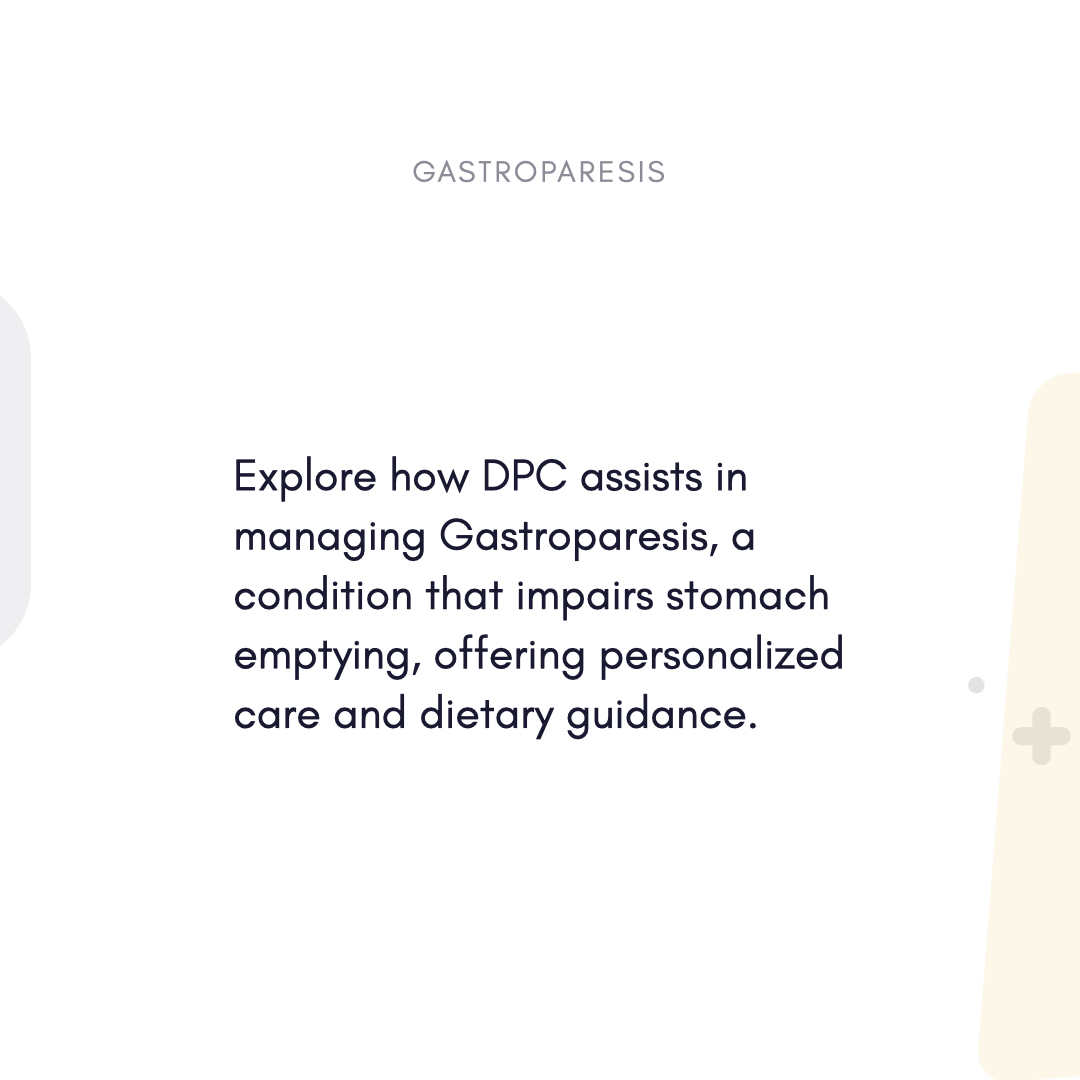Gastroparesis and Direct Primary Care (DPC): Your Path to Personalized, Effective Relief
You could be among the millions afflicted by gastroparesis, a disorder in which delayed stomach emptying disturbs digestion, if you have ever felt full after just a few bites of food, battled constant nausea, or experienced erratic blood sugar swings. Ignored, it can cause malnutrition, dehydration, or possibly fatal complications. Direct Primary Care (DPC), however, presents a customized, proactive method for managing gastroparesis that stresses symptom control, root-cause healing, and long-term stability—all without insurance hassles. Let's investigate that way.

What Is Gastroparesis?
- When the muscles of the stomach fail to contract correctly, gastroparesis results—that is, food movement into the small intestine slows or ceases.
- Common causes consist in:
- Diabetes, the main cause since nerve damage affects it.
- Post-viral infections; autoimmune diseases; surgical complications.
- Drugs including antidepressants or opioids.
- Symptoms comprise:
- Early satiety—that quick sense of fullness.
- Regular nausea and vomiting—especially from undigested food.
- Bloating, heartburn, or stomach trouble.
- Diabetics' erratic blood sugar levels.
- Long-term consequences of untreated gastroparesis:
- Severe weight loss and malnutrition.
- Damage to the oesophagus from repeated vomiting.
- Bezoars—hardened food masses—that call for surgery.
How DPC Changes Gastroparesis Care
How DPC Changes Gastroparesis Control: Management
Usually costing USD 50–150, Direct Primary Care (DPC) is a membership-based model whereby patients pay a monthly fee for unlimited access to their primary care physician. For those with gastroparesis, this translates into no hurried visits, no surprise bills, and a care schedule as distinct as your symptoms. DPC changes gastroparesis control by:
- Tailored Attention Anchored in Medical Expertise:
-
- DPC doctors give long-term, frequent visits top priority to manage this complicated disorder. Drawing on American Gastroenterological Association (AGA) recommendations, they:
- Sort symptom degree: Create mild, moderate, or severe case-specific treatments.
- Create specialized plans: Combine low-fiber, low-fat meals or liquid nutrition with prokinetics (e.g., metoclopramide) and antiemetics.
- Deal with core causes: Screen for drug triggers, autoimmune diseases, or diabetes.
- Transparent, Affordable Treatment:
- 2. DPC clinics cut expenses by means of preventative emphasis: By improved outpatient management, reduce ER visits and hospitalizations.
- Generic prokinetics or anti-nausea drugs at a pharmacy cost wholesale.
- Discounted specialized coordination: Referrals to dietitians or gastroenterologists at negotiated cash rates.
- Ongoing Assistance for Equilibrium:
- 3. Having 24/7 access to your doctor allows you to change treatments during flare-ups—that is, diabetic crises or dehydration.
- Track changes using food/symptom logs or glucose monitoring.
- Get mental health help for anxiety connected to a chronic disease.
Key Benefits of DPC for Gastroparesis Patients
- Improved Accessibility: Same-day evaluations for dehydration concerns or vomiting attacks.
- Customized Lifestyle Plans: Diet changes (e.g., little, frequent meals), stress management, and exercise modifications.
- Cost Savings: Patients avoid ER visits and inflated specialist fees, so saving 30–50%.
Real-Life Success Stories
- Case 1: 38-year-old Sarah battled erratic blood sugar and ongoing nausea from diabetic gastroparesis. Her DPC provider advised low-cost prokinetics, developed a liquid diet plan, and worked with her endocrinologist to steady her glucose. She has skipped ER visits for a year.
- Case 2: After a viral infection, 52-year-old Mike developed gastroparesis. His DPC doctor linked him with a dietitian, wrote anti-nausea patches, and ordered a discounted gastric emptying study. In eight weeks his symptoms cleared.
Frequently Asked Questions About DPC and Gastroparesis
- Can DPC manage severe gastroparesis calling for feeding tubes?
- A: Sure. For advanced cases, DPC works with surgeons or GI experts; often, this helps secure reduced self-pay rates for procedures.
- How does DPC help diabetic gastroparesis sufferers?
- A: To steady digestion, combine dietary plans and prokinetics with blood sugar control.
- Is DPC reasonably priced for long-term care?
- A: True. Clear pricing for drugs and regular follow-ups helps sustain chronic treatment.
Why DPC Stands Out for Gastroparesis Patients
The AGA stresses multidisciplinary, patient-centered treatment for gastroparesis. DPC guarantees: by removing insurance hurdles:
- Timely Interventions: Quick changes in diet help prevent hospitalizations or malnutrition.
- Frequent check-ins under holistic monitoring improve treatment efficacy—that is, medication tolerance.
- Tools for symptom management and trigger avoidance—that is, high-fat foods—empowerment.
Take Control of Your Gastroparesis Right Now
Gastroparesis doesn't have to control your life. DPC helps you find a partner who respects your budget, knows your background, and enables you to take charge of your digestion and health. All set to balance your gut and flourish? Look for a DPC provider close by and have healthcare as proactive as you are.
How DPC Specifically Helps Gastroparesis Patients
Rooted in accessibility, continuity, and teamwork, DPC's framework directly tackles gastroparesis issues:
- Symptom-Driven Treatment: Sort interventions according to AGA recommendations for severity.
- Liquid nutrition and vitamin/mineral supplements prevent deficits.
- 24/7 access allows control of flares before they worsen.






